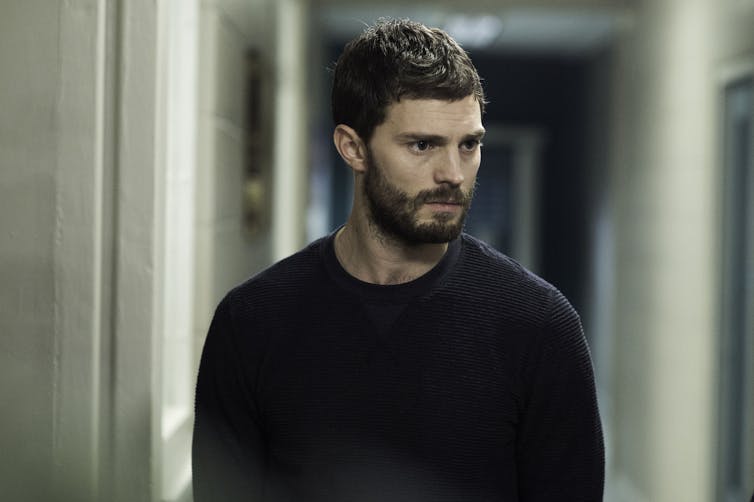Misogyny or not misogyny? That, it seems, is the question. Having just concluded its third and final series, the BBC crime thriller The Fall tells the tale of fictional serial killer Paul Spector, aka “The Belfast Strangler”. Spector – played beguilingly by former model Jamie Dornan – specialises in dispatching pale pretty women with long black hair. His preferred modus operandi is aesthetically perfected strangulation using the usual bondage props (plastic bag, leather belt, boy-scout knots and a balaclava).
This season attracted particular attention, not just for what’s been described as misognynistic “crime porn”, but also for its increasingly dilapidated storyline. Serial killer Spector lost his memory and the rest of us lost the plot. So why exactly did we fall for The Fall?
Since 2013 we have watched Gillian Anderson playing moody detective Stella Gibson (sidelong glances, one permanently raised eyebrow, increasingly breathy asides and lots of black silk) pursuing Spector while transparently indulging her own obsession with the self-appointed Lord of Death. Other admirers include precocious schoolgirl Katie Benedetto who is dying (almost literally) to sleep with him; and a peculiarly-devoted nurse who gazes solicitously into his eyes and bites her lips while counselling Spector on the redemptive possibilities of life after death. Because Spector might be a sadistic serial killer, yes, but he has feelings. And in the final series he appears to lose his memory, claiming to know nothing at all of his foul prior deeds. That makes him almost innocent, right?

And what of that title, The Fall? Fall from what? Fall from Grace? The Biblical Fall? In which Eve tempts Adam with an entire suite of Freudian symbols and thereby dooms humanity for perpetuity? What is the Original Sin to which the title alludes? Is it one in which women, like Eve, are to blame?
One of Spector’s rescued victims makes a teary-eyed admission to an equally moist Gillian Anderson – that she had initially participated willingly in Spector’s faux-necrophiliac sex games (we gather from this that, unlike amnesiac Spector, she hardly counts as innocent). “He told me I was the only one,” she weeps, and stares knowingly at Gibson before adding: “I’m glad I’m not the only one – to make a mistake.” Gibson, shame-faced, only gulps.
Writer Alan Cubitt is “hurt and upset” at being accused of misogyny. But maybe misogyny isn’t the point. You don’t need to hate women to portray them as helpless, complicit, gullible, culpable, sexually obsessed, death-invested masochists – although it surely helps.
Besides, it’s not just women. A hapless male admirer called Bailey also falls foul of Spector’s fluttering eyelashes, although the leaden hint that Bailey is a confused homosexual with severe mental health problems (he raped his own sister, we learn, before throwing her to the chomping jaws of a dustbin van – an imaginative touch from Cubitt) renders him an unsympathetic, “feminised” and therefore “acceptable” victim. So we can hardly blame Spector for strangling him from behind with a belt; the two roll on the floor like amorous spoons, with Spector’s leg wrapped tightly around the dying man’s crotch. A world of subtexts at which the bemused viewer can only wonder.
What of Spector himself? I’m not sure a sexual sadist has ever been portrayed so sympathetically on prime time television. And is it just coincidence that his name recalls the celebrated woman-beater Phil Spector? There he is, showing us all of the feels, adrift in a sea of forgetfulness; big grey eyes blinking back tears and confusion in equal measure. Maybe, we are given to impute, he is misunderstood. Maybe, we think, he just needs help. Maybe from one of the women watching the show. Maybe it could be you.
A not-so-subtle intertextuality links The Fall to Fifty Shades of Grey. After all, having already established himself in The Fall as the poster boy of rape fantasies, in 2014 Dornan starred on cinema screens and double-decker buses up and down the land as sexy sadist Christian Grey.
Presumably Dornan’s extra-textual double life influenced directorial decisions to hyper-eroticise Spector, with cameras lingering on his naked showering torso – and a touch of slow motion rinse-action thrown in for good measure. All attempts at characterisation replaced by voyeuristic camera angles and quivering silences intended to crank up the sense of impending orgasm. Stella Gibson sighs and fingers her silk lapels while Spector soaps his chest and doesn’t know who he is any more. One might say that, somewhere along the line, the show morphed into an unofficial TV spin-off: Fifty Shades of Dornan.
And this, perhaps, is the issue. Accusations of misogyny both hit and miss the point. There has been throughout The Fall a fetishisation of dead women – one that, as Elisabeth Bronfen has shown, has a long and morbid history in western art and culture – and a concomitant suggestion that women (and possibly gay men) are gladly complicit in their porno-violent deaths. What’s so troubling about The Fall is that the heterosexual man at the centre of it all rises above them like a god, a seemingly blameless and clear-eyed target of their unsolicited and implicitly guilty attentions. And we never did establish whether Spector’s amnesia was real or faked; whether or not this ambiguity was intentional matters less than the fact that his dubious aura of blamelessness persisted all the way to the closing credits.
Perhaps in the end we should trouble ourselves less about whether Cubitt is or isn’t a misogynist, or whether creating aggressive and psychopathic female characters in our TV dramas would be a useful counterbalance (it almost certainly would not, but that’s another story).
Rather we might wonder why fictitious characters such as Paul Spector have the power to excite so many women, both on and off the screen. The answer, I am inclined to believe, may be attributed to culture – not nature.

